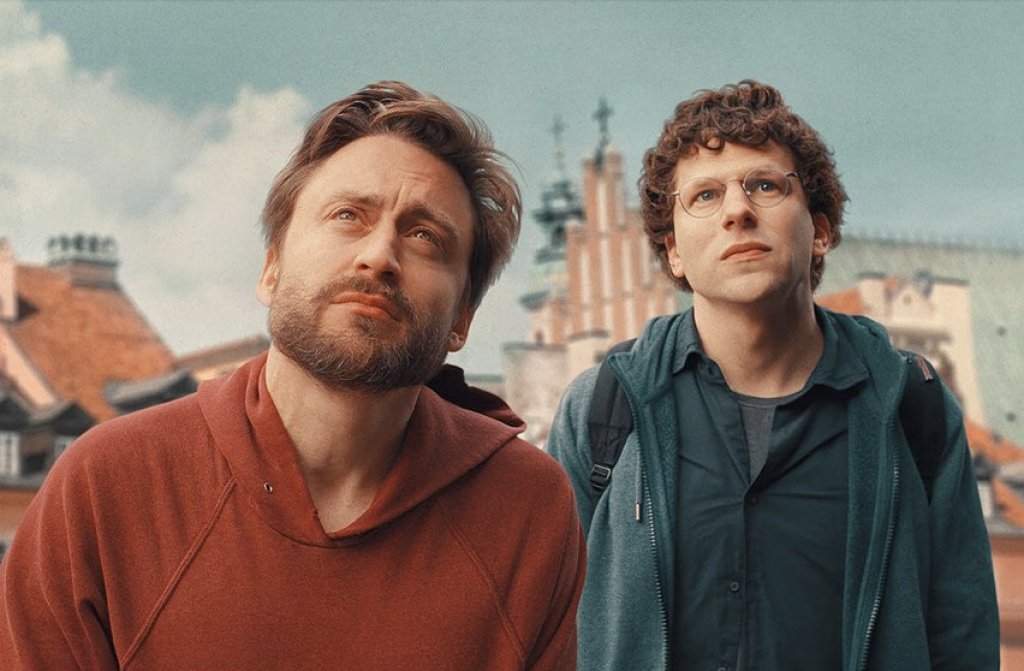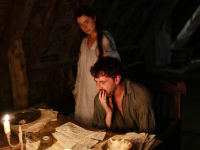After the death of their Grandmother, a pair of estranged cousins decide to go on a trip to Poland to connect with their family’s past.
‘A Real Pain’ marks Jesse Eisenberg’s second directorial outing and he didn’t exactly go easy on himself subject-wise. The film follows American-Jewish cousins David and Benji, who set out to pay respect to their family ancestry by joining a Holocaust tour group and visiting important locations across Poland. However, what starts out as a sort of mis-matched ‘buddy comedy’, slowly evolves into something more emotionally impactful and thought provoking.
David (Jesse Eisenberg) is a stereotypically anxious 40-something husband and father, who’s tentatively carved out the time away from his successful career to take the trip with Benji (Kieran Culkin) a seemingly free-spirited slacker with a chequered past. Despite David’s best efforts to stay on time and keep up with the tour group, Benji is frequently distracted and hyper-animated despite the tour’s solemn subject matter.
Both performances are enjoyable and somewhat mirror the actor’s real life personas. On a recent podcast I listened to with Culkin as a guest, he told a story about how he would frequently turn up to set and tease Eisenberg about not knowing his lines well enough, forcing him as director to take a more ‘relaxed’ approach to blocking out and rehearsing scenes on location. Culkin even remarked that eventually this led to a more natural and engaging performance from both of them, which has even earned Culkin a Golden Globe win for his role.
After meeting up with their tour group comprised of divorcee Marcia (Jennifer Grey), Eloge (Kurt Egyiawan) a Rwandan who has converted to Judaism, married couple Diane (Liza Sadovy) and Mark (Daniel Oreskes) and also British tour guide James (Will Sharpe). It’s not long before anarchic Benji is leading them off to take comical pictures in front of war memorials and berating the group for travelling first class on a train, which he feels uncomfortable with as a Jewish person in Poland.
In all the situations throughout the film, David’s frustration at his effortlessly likeable cousin morphs into sympathy as revelations about Benji’s past come to light. Throughout the film, Benji’s frustrations grow as they visit important locations like a grave site, in which Benji dresses down tour guide Will for stating too many ‘facts’ and not connecting enough with the human experience of the place. The tour culminating with a heart-wrenching visit to the Majdanek concentration camp, where the group move silently from room to room, the palpable tension and sadness being felt by all as they witness the remnants of the atrocities committed there.
Eisenberg does well with his self-penned script, which on the surface can seem somewhat uneventful. But the central performances of the two actors really ground the film in something real and moving. The cinematography is simple, never distracting from the characters, even the subtle piano-driven score which uses Chopin’s piano pieces never overwhelms or detracts from the subject matter. I was reminded somewhat of 2003’s ‘Lost in Translation’, a film similar in tone that deals with the melancholy, humour and hope of searching for one’s self in a foreign land. Even Eisenberg’s script feels loose and improvisational, helping to keep the characters from becoming caricatures. You can feel David and Benji wrestle with the gravity of where they are and what their ancestors went through, and their struggle with being reminded that nothing their going through even remotely compares. Even when they move off from the tour group to visit their dead Grandmother’s old house, they’re not able to process their emotions as they’re interrupted by a grumpy neighbour.
What starts off as a somewhat wry comedy, ‘A Real Pain’ evolves into something more heartfelt, funny and sad all at the same time, without outstaying it’s welcome with a relatively tight run time of just 90 minutes. It’s a win from Eisenberg in both the director’s chair, as co-star and for bringing Culkin onboard to play his familial foil. Nothing is truly ‘solved’ by the end of the film, nor was any of it pointless… it’s a thoughtful and revealing film, which I’m sure will become even more layered upon repeat viewings.
Author: Arron Dennis







